Post Archive
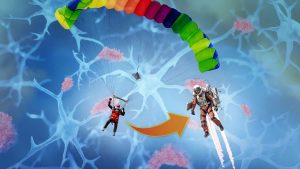
From Parachutes to Jetpacks: Clearing Brain Beta-Amyloid with Donanemab or Lecanemab Works, Though More Must be Done
Another clinical trial has now proven that a second AmyloSENS rejuvenation biotechnology that clears beta-amyloid aggregates from the brain also slows down the slide into dementia in people in the early stages of Alzheimer’s disease, but this development is only the beginning.

Lights, Camera, Action on AI-Powered Drug Discovery
Docuthon is the world’s first documentary-creating competition on AI-powered drug discovery, providing an opportunity for every talented filmmaker to get involved in a cutting-edge industry, share a terrific science story, and inspire the next generation of scientists in longevity.

SENSible Question: Billionaires Redux
A supporter raises a new angle on an old concern: might fabulously wealthy people hoard longevity therapeutics for themselves? The context for the question and the motivation behind it are different, but the answer is still “no.” Rejuvenation biotechnology will be widely available to aging people, and SENS Research Foundation will work at the front end and the back end to ensure that access to longevity therapeutics expands as quickly and as widely as possible.
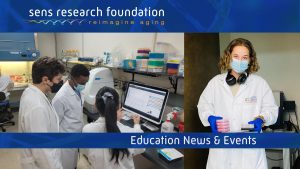
Education Department May 2023 Updates
The 2023 application season is coming to a close with a very competitive applicant pool. Read more about highlights and upcoming events.

An Oil Change is Not a Gasket Change: Insights from the Interaction of “Old Blood” and Senolytic Therapy
When blood from a biologically aged animal is transfused into a young one, the young animal suffers “pro-aging” effects. By contrast, reducing the burden of “pro-aging” signaling factors in old blood is not enough to remove existing damage from a similar-aged mouse’s biologically aged tissues.
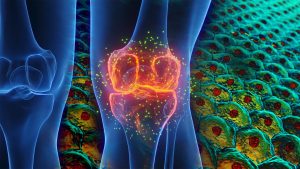
Kneecapped by Aging: New and Scrutinized Science Suggests Why the UNITY Osteoarthritis Trial Failed
UNITY Biotechnology was the first senolytic startup out of the gate, and the failure of its Phase II trial in osteoarthritis was a crushing disappointment. A careful look back at the underlying science and three new scientific papers give us a good idea why and suggest ways to move forward.

SENSible Question: How Might Cyclarity’s UDP-003 Compare to EDTA Chelation?
A supporter asks us to compare the expected benefits of Cyclarity’s UDP-003 to chelation therapy. Although both target the age-related scourge of atherosclerotic cardiovascular disease (ASCVD), EDTA (if it works) dampens down the worst aspects of having ASCVD, while UPD-003 is a SENS “damage-repair” therapeutic which is expected to remove the underlying damage itself and reverse the disease process.
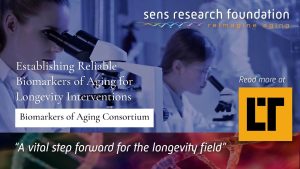
Announcing the Biomarkers of Aging Consortium
A significant and vital step forward for the longevity field: the Biomarkers of Aging Consortium. Formed of a diverse group of academic and industry members, the Consortium seeks to “establish reliable biomarkers of aging, particularly for the identification and evaluation of longevity interventions. Learn more…
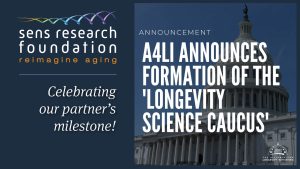
Action at the Governmental Level for Longevity
As partners of the Alliance for Longevity Initiatives (A4LI), SRF is excited to announce the formation of the Longevity Science Caucus to promote initiatives aimed at increasing the healthy average lifespan of all Americans. Read more…

The Iron Fist Unleashed!
One way senescent cells accumulate is when one senescent cell turns a neighboring cell senescent through SASP secretion. SRF scientists have discovered that these secondary senescent cells are resistant to the classic senolytic drugs. However, they have identified a new senolytic strategy that kills these senescent cells.
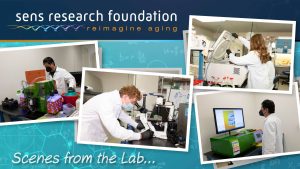
Scenes from the Lab
Much of SRF’s research would not be possible without complex scientific equipment. SRF would like to thank its donors for their generous contributions which allow for the purchasing of this equipment, directly enabling research in ending age-related diseases.
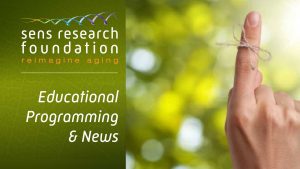
A Busy Spring in the Education Department
The Education Department is hard at work evaluating over 390 student applications and looking forward to hosting presentations and visiting professional fairs in the coming weeks.

SENSible Question: Wouldn’t Worms Be Faster?
A supporter asks us if it would accelerate research progress much faster if did most testing in far shorter-lived animals, like the roundworm C. elegans or the fruit fly Drosophila – rather than mice.
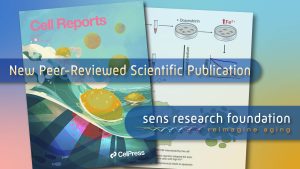
New Peer-Reviewed Paper from SENS Research Foundation: Iron Homeostasis as a Senolytic Target
Scientists at SENS Research Foundation led by Dr. Tesfahun (Tes) Dessale Admasu have just published their exciting new senolytic strategy to destroy a wider range of senescent cells than has up to now been possible.

A TAME Attempt to Slow Aging Part 5: Winning the Game with a Weak Hand
Metformin has been proposed as an “anti-aging drug,” and scientists are organizing TAME, a major clinical trial to test the idea. In the final installment of this 5-part series, we look at TAME itself: how it’s structured, how it’s justified, and how the results could impact the push for longevity therapeutics.

SENSible Question: New MitoSENS Strategies
A supporter asks us to elaborate on projects other than allotopic expression (AE), that SRF has undertaken that are targeting mitochondrial dysfunction; and how they relate to the original strategy of allotopic expression?

A TAME Attempt to Slow Aging Part 4: Mixed Messages on Metformin and the Mind
Metformin has been proposed as an “anti-aging drug,” and scientists are organizing TAME, a major clinical trial to test the idea. In Part 4 of this 5-part series, we look at human data on metformin and neurodegenerative aging diseases.

SENSible Question: Is Targeting Beta-Amyloid Founded on Fraud?
A supporter asks about the investigative report in Science magazine that suggests the critical study identifying beta-amyloid oligomers as the key actors in Alzheimer’s disease may have been based on fraudulent data.


